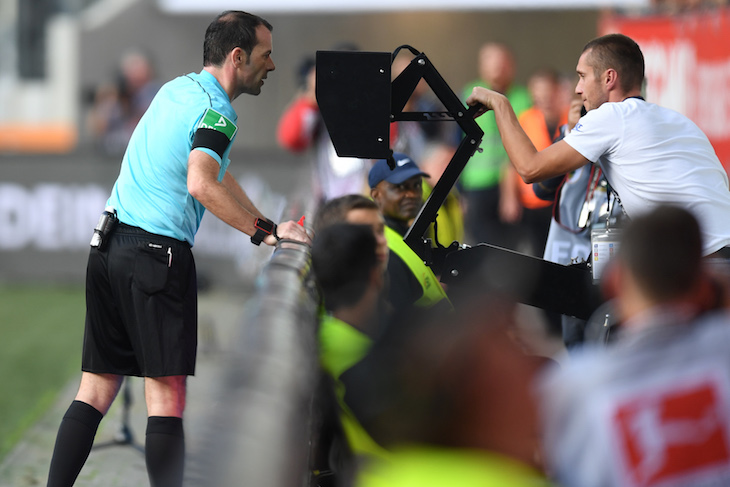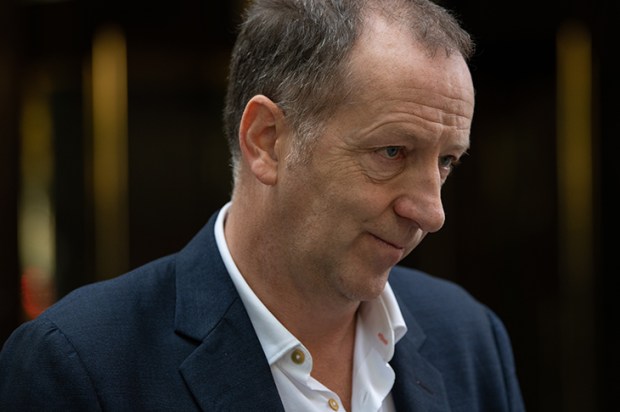They’ve got this new thing in football. It’s called the Video Assistant Referee and it is designed to make the game, at the highest level, pristine and free from human error.
This is, to my mind, a mistaken aspiration in a game that relies on human error for its excitement, especially when the England goalkeeper Joe Hart is playing. Anyway, what happens is this. When the referee isn’t sure about some crucial incident on the pitch, he summons another referee via a headset to help him. The other referee is many miles away, watching the match on the television. The ref stops the game and wanders over to have a look at a video screen by the side of the pitch. And he and the other referee, all those miles away, talk about it for two or three minutes, while the crowd gets bored and the flow of the game is lost, and then he makes the wrong decision. Or maybe, who knows, the right decision. A decision.
My guess is that soon it will be expanded to a panel of experts, or perhaps to the International Court of Justice. Or possibly, one day not too far down the line, Jesus Christ, Buddha, Muhammad and maybe one of those smallpox deities the Hindus admire, all glued to a TV in a hotel room somewhere, bickering about whether or not the talented if histrionic Liverpool striker Mohamed Salah took a dive or not. (‘Definite foul in my book,’ says Muhammad, reaching for a salt ’n’ vinegar Kettle chip. ‘Bollocks, you’re biased,’ replies Christ, finishing his can of Stella. ‘If he’d been called Reuben Goldstein you’d have sent him off for diving.’)
Because at heart, that is what the VAR really is: a God substitute for a game that has ideas way above its station. An appeal to omnipotence, because these days too much money is at stake for decisions to be taken by one lone human being. The footballing authorities want doubt excised from life, but there will always be doubt and a second man with a TV won’t change that. Nor does looking at stuff in slow motion: the game isn’t played in slow motion, unless you’re a Manchester United fan. Slow motion can often make tackles look a lot worse than they really are, no matter how experienced the observer. They are trying to make football perfect when many of us relish its imperfections as much as we enjoy the skill. We can relate to imperfections, because we have many ourselves.
Although perhaps not as many as are regularly witnessed in a game of women’s football. Have you ever watched that stuff? They are truly, shockingly, useless, the chicks. A morbidly obese and aged pub side from, say, Tamworth would beat the England women’s team with ease, providing the side was comprised of fat men and not fat women. Indeed, the Australian women’s football team were beaten 7-0 by a bunch of not terribly good 15-year-old boys in 2016. And yet women’s football is foisted upon us, largely by the idiotic BBC, for political reasons. They know almost nobody pays to watch women’s football live. They know the standard is not simply lamentable but hilarious. But it fits their agenda — as did televising the Africa Cup, which the former BBC controller Danny Cohen announced he was doing in order to portray Africa in a positive light, for which many thanks, Danny, you presumptuous, arrogant, liberal tosser. Nobody watched it.
Meanwhile, I turned on my TV last Sunday evening in the hope of watching the highlights of my side, Millwall, scraping a plucky draw against Rochdale. Instead, they were showing something which appeared to be a natural history programme about some forlorn wading birds — avocets, perhaps, or ibis — marooned in sand, watching balefully as a balloon passed overhead. Women’s football again. I made my excuses and left.
In an attempt to enhance the glamour of women’s football, the Football Association has appointed that quintessence of charisma Phil Neville to manage the England team. Phil was a decentish full back for Everton and Manchester United and, quite often, England. Subsequent to his appointment tweets were discovered which — for some — cast doubt on his suitability for the job. He had joked about women making the dinner and stuff. And more damagingly had once said ‘Just battered the wife — feel better now!’ This last comment, Phil later made clear, referred to the fact that he had just defeated his wife at table tennis, not that he had kicked the living shit out of her. He admitted he had no evidence to support his alibi, although an indication of the score would surely have helped. But in truth anyone appointed to a job can expect this sort of febrile rummaging through everything they have ever said anywhere to anyone and wrenched out of context and used as a stick to beat them with.
Not that such a stick is needed. There are plenty of people who think Neville should not have got the job simply because he is a man. So, for example, the former England women’s goalkeeper (the female goalies are especially useless) Pauline Cope-Boanas said: ‘He’s never worked within the women’s game and that’s the crux of it. It is different. We deal with emotional things, women have women’s problems, monthly problems, relationship problems, we are emotional.’
I suppose it is probably true that Phil Neville does not have the sort of monthly problems to which this woman alludes, although I cannot be sure. But I seem to recall much fury being engendered when it was suggested that women couldn’t do certain men’s jobs because they were too emotional and liable to break down in tears. Such appalling sexism. And yet we seem to have shifted 180 degrees: now men are not able to do some women’s jobs for the converse reasons. You can’t have it both ways, babes.
Got something to add? Join the discussion and comment below.
Get 10 issues for just $10
Subscribe to The Spectator Australia today for the next 10 magazine issues, plus full online access, for just $10.
You might disagree with half of it, but you’ll enjoy reading all of it. Try your first month for free, then just $2 a week for the remainder of your first year.















Comments
Don't miss out
Join the conversation with other Spectator Australia readers. Subscribe to leave a comment.
SUBSCRIBEAlready a subscriber? Log in